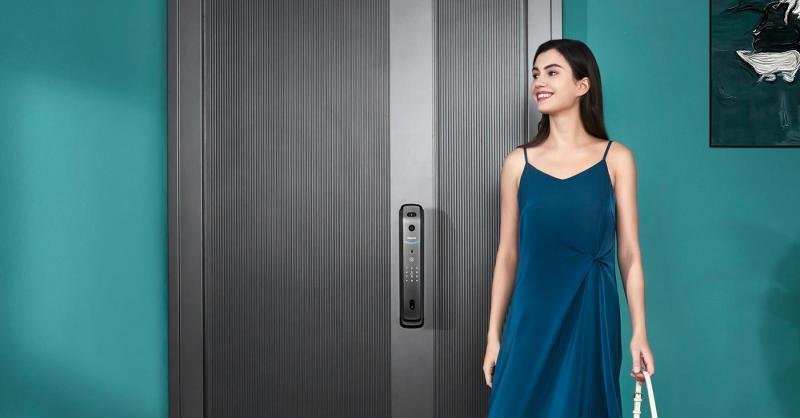Yes! Any technology that connects to the internet can be broken. Smart door locks can be hacked too. It’s a mechanical device and so it doesn’t have a 100% security guarantee. However, smart locks work with a conventional locking mechanism, which can be physically opened with a key, or virtually opened with your fingerprint, RFID card. You can monitor it anytime and anywhere. If anyone breaks into your house without your permission, you’ll have notification from your locks. Then call the policeman to deal with such a case. That’s why we pay the tax, right?
Doors are designed with the progressive Philips smart lock benefit to get entry to the satisfaction of each world. It allows families to screen their doors in real time. In addition, it even removes the danger of being hacked via dangerous far-off unlocking capabilities that traditional smart locks provide.
Are Smart Locks Truly Secure?
Imagine you left the metropolis and forgot to depart with a key to your dog sitter. Or perhaps you left the house in a hurry and can’t forget whether or not you locked the door. What ought to or should you do? With a traditional lock, you might have to name a neighbour for help or head domestic yourself. With smart locks, you can lock and liberate your door from everywhere in the world.
All you need is the proper app and an internet connection. Philips provides a great door-locking system that is far better than the traditional locking system. That technology sounds handy, but are smart locks safe? The quick solution is sure, but there are a few elements to consider.
Smart locks’ protection varies depending on the particular model and how they’re carried out and used. While many smart locks offer robust protection features, which include encryption, -factor authentication, and cozy communiqué protocols, there is no person-length-suits-all answer to their security. The key to ensuring the security of a smart lock is thorough research and careful selection of a good emblem and model with a track report of prioritizing security.
Additionally, users should observe fine practices, which include using strong, precise passwords, preserving software updated, and being privy to capability vulnerabilities. While smart locks can offer comfort and enhanced security features, it is essential to approach their adoption with an essential eye and a knowledge of each of their strengths and potential risks.
How Do Smart Locks Work?
Smart locks are innovative devices offering digital and far-flung manipulation over locking and unlocking mechanisms, commonly for doorways. The paintings combine conventional mechanical lock additives with electronic components and connectivity functions. Here’s how smart locks normally work
- Lock Mechanism
Philips Smart locks have a bodily lock mechanism like traditional locks, including deadbolts or latch bolts. This mechanism is used to ease the door physically.
- Electronic Components
Smart locks have digital additives, including a microcontroller or processor, sensors, and a motor or actuator. These additives allow for electronic management of the lock.
(a) Connectivity
Most smart locks can connect with your private home Wi-Fi network or communication protocols like Bluetooth, Zigbee, or Z-Wave. This connectivity enables far-flung management and verbal exchange with other devices.
(b) User Interface
Smart locks regularly come with a cellular app or an internet interface that lets users manipulate the lock remotely. Users can lock the door using their smartphones or computers.
- Authentication
Smart locks require a few forms of user authentication. This can consist of getting a PIN code, using biometric authentication like fingerprints or facial reputation, or unlocking through a cell app using secure credentials.
- Remote Access
Smart locks offer far-off access abilities, allowing users to govern the lock from everywhere with a web connection. This function is handy for granting guests or carrier vendors access while you’re no longer at home.
- Integration
Many smart locks are like-minded with smart domestic ecosystems and voice assistants like Amazon Alexa, Google Assistant, or Apple HomeKit. This integration allows for voice commands and automation with other connected gadgets in your home.
- Security Features
Smart locks regularly include superior security capabilities, such as encryption for verbal exchange, -element authentication, and tamper signals. These features assist in defending towards unauthorized access and hacking attempts.
- Logs and Alerts
Some smart locks maintain a log of lock and unlock activities, giving users a record of who accessed the door and whilst. They can also send indicators or notifications on your telephone while sure activities occur, which include a failed access try.
- Battery or Power Sources
Smart locks are commonly battery-powered, requiring a strength source. Some models have backup power options if the batteries run out, ensuring you can get admission to your home.
What is the Technology Behind Smart Locks?
Here is the technologies behind the smart lock.
- Z-Wave/Zigbee
Smart locks using Z-Wave or Zigbee are also famous alternatives amongst smart homes. These two Wi-Fi protocols don’t talk directly with a cellphone but communicate with a crucial hub connected to a domestic Wi-Fi community.
Usually, these homes may have different smart home technologies using the equal Wi-Fi protocol, allowing for full domestic integration. Because the valuable hub is hooked up to a home Wi-Fi network, house owners can control their smart locks from anywhere worldwide, so long as they have a web connection.
- Wi-Fi
Locks the usage of Wi-Fi connect at once with the home community. This choice is the handiest setup for smart lock generation. However, Wi-Fi is electricity stressful, so battery lifestyles may also be an issue. Like Z-Wave and Zigbee, Wi-Fi-enabled smart locks provide house owners with smart locks to get the right of entry at the same time as far from the house, as long as there is a web connection.
Are They More Secure than Traditional Locks?
Despite what all and sundry would love to believe, maximum common locks are distinctly vulnerable to selecting – a skilled burglar ought to snap a deadbolt and level a wreck-in in the simplest of seconds. Unfortunately, your front door isn’t as comfortable as you’d assume that it’ll, pretty much, only maintain out the ‘sincere’ criminals who are either now not quite inclined to push their luck or honestly green beginners.
Realistically, cracking a keyless lock’s encrypted code isn’t always extremely tough – however, surprisingly not likely. Reputable smart locks like Philips rely upon contemporary authentication, authorization and encryption technology, which, if incorporated into your property protection machine, become a powerful protection solution against thieves and intruders.
Can Smart Locks Be Hacked?
Smart locks, like any digital device linked to the net or Wi-Fi communication can probably be vulnerable to hacking. However, the extent of the threat largely depends on the particular make and model of the smart lock, how it is configured, and the security practices of the person. Here are a few potential vulnerabilities and approaches to mitigate them:
- Weak Passwords
Using a weak or effortlessly guessable password in your smart lock’s cell app or internet interface could be liable to brute pressure attacks. Always use strong, specific passwords and consider permitting -element authentication when available.
- Unsecured Wi-Fi
If your smart lock connects to your private home Wi-Fi community, ensure your Wi-Fi network is comfortable. Use WPA3 encryption and a sturdy Wi-Fi password to shield your network from unauthorized access.
- Outdated Software
Failing to update the smart lock’s firmware and associated apps can make it prone to acknowledged exploits. Regularly update the lock’s software program to patch safety vulnerabilities.
- Bluetooth Vulnerabilities
Some smart locks use Bluetooth for communique, which may have vulnerabilities if not well secured. Ensure your Bluetooth connections are encrypted, and use the contemporary Bluetooth standards if needed.
- Physical Attacks
Smart locks can be liable to physical attacks, lock picking or drilling. Choose a smart lock with strong bodily protection features, and ensure it’s properly set up.
- Unauthorized Access to Mobile Devices
If someone gains entry to your telephone or other device with the smart lock app established, they may doubtlessly control the lock. Secure your cellular device with a robust passcode or biometric authentication.
- Man-in-the-Middle Attacks
In rare instances, attackers might attempt man-in-the-centre attacks to intercept and manipulate communications between your mobile app and the smart lock. Ensure that your lock makes use of secure, encrypted communique protocols.
- Vendor Security Practices
The security of smart locks also relies upon the producer’s safety practices. Choose reputable manufacturers that prioritize safety and provide well-timed software program updates.
- Third-party Integrations
If your smart lock integrates with other smart home devices or platforms, vulnerabilities in the integrations could affect the general safety of your smart lock machine. Keep all connected gadgets up to date.
- Shared Access
Be careful whilst granting entry to others, including visitors or service carriers. Use brief get entry to codes or constrained-time permissions to decrease capability protection risks.
What Are The Factors Affecting Smart Lock Security?
Smart lock safety is influenced by numerous key factors, all of which collectively decide the general electricity of the machine. Firstly, the manufacturer and logo popularity are important. Established, reputable manufacturers normally invest extra research and improvement, producing more comfy products.
The smart lock’s bodily security functions, including its creation and resistance to tampering, play a pivotal function. High-best materials and adherence to industry requirements, such as ANSI/BHMA ratings, contribute to physical robustness.
Regular software updates are any other essential component. Manufacturers must offer well-timed updates to patch vulnerabilities and improve safety. Finally, consumer behavior and practices additionally rely notably on.
Strong, specific passwords, careful sharing of entry to credentials, and focus on capacity dangers can extend in preserving the security of a smart lock machine. A combination of manufacturer diligence and personal responsibility is critical to maximizing smart lock safety.
Are There Any Ways to Enhance Smart Lock Security?
Certainly, there are numerous ways to enhance the safety of your smart lock. Start by choosing a relied-on logo and model with a strong music file in protection. Use robust person authentication strategies, including complicated PIN codes or biometrics, and avoid vulnerable passwords. Regularly replace your smart lock’s firmware and related apps to patch vulnerabilities.
Secure your home Wi-Fi community with strong encryption and passwords because smart locks regularly depend on Wi-Fi. Monitor getting admission to permissions diligently, revoke unnecessary rights of entry, and use temporary codes for guests.
Strengthen physical protection with satisfactory door hardware and teach family members about protection practices. These measures together bolster your smart lock’s safety.

Final Thoughts
In conclusion, while smart locks provide comfort and advanced security features, they’re not immune to ability vulnerabilities. Like conventional locks, smart locks can be challenged by numerous protection risks, hacking tries, and bodily assaults.
However, the extent of safety largely relies upon factors, including the emblem and model chosen, user practices, and the implementation of safety functions. By deciding on reputable manufacturers like Philips, using robust authentication strategies, retaining ordinary software updates, and adopting great protection practices, users can considerably reduce the chance of their smart locks being compromised.




